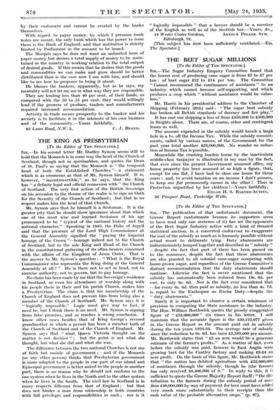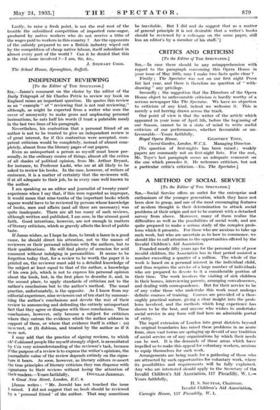[To the Editor of THE SPECTATOR.] SIR,—The publication of that
unfortunate document, the Greene Report (unfortunate because its supporters seem to have read only one sentence of it) has set the opponents of the Beet Sugar Industry active with a kind of frenzied statistical auction, in a concerted endeavour to exaggerate the cost of the subsidy as much as is humanly possible without actual resort to deliberate lying. Duty abatements are indiscriminately lumped together and described as " subsidy "
— despite the fact that part of them has been passed on to the consumer, despite the fact that these abatements are also granted to all colonial cane-sugar competing with home-grown sugar, and regardless of the Greene Committee's distinct recommendation that the duty abatements should continue. Likewise the fact is never mentioned that the subsidy has automatically been reduced from 19s. 6d. per cwt. to only 6s. 6d. Nor is the fact ever considered that — for every Hs. 6d. thus paid as subsidy, no less than 4s. 7d. is repaid to the Exchequer as Excise Duty—despite the duty abatements."
Surely it is important to observe a certain minimum of precision in computing the State assistance to the industry. The Hon. William Borthwick quotes the grossly exaggerated figure of " £53,000,000 " six times in his letter. I still maintain that the accurate figure is the. £30,122,077 given in the Greene Report as the amount paid out in subsidy during the ten years 1924-34. The average rate of subsidy since the reduction to 6s. 6d. has been £2,580,000 per annum. Mr. Borthwick states that " 13 an acre would be a generous estimate of the farmer's profits." As a matter of fact, even before the subsidy was paid, farmers in East Anglia were growing beet for the Cantley factory and making 23-24 an acre profit. On the basis of this figure, Mr. Borthwick states that " the nation has debited agriculture with £53,000,000 of assistance through the subsidy, though he (the farmer) has only received £8,400,000 of it." In reply to this, it is sufficient to quote the Greene Majority Report itself :'" the dis- tribution to the farmers during the subsidy period of more than L40,000,000 by way of payment for beet must have added very much more substantially to their receipts than the cash value of the probable alternative &bps." (p. 67). Lastly, to raise a fresh point, is not the real root of the trouble the subsidized competition of imported cane-sugar, produced by native workers who do not receive a tithe of the wages paid to workers in this country ? Are the opponents of the subsidy prepared to see a British industry wiped out by the competition of cheap native labour, itself subsidized in almost every part of the world? Can it be denied that this is the real issue involved ?—I am, Sir, &e., J. STEWART COOK.
The School House, Sproughion, Suffolk.















































 Previous page
Previous page